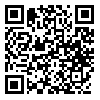Volume 19, Issue 1 (5-2024)
MGj 2024, 19(1): 1-9 |
Back to browse issues page
Download citation:
BibTeX | RIS | EndNote | Medlars | ProCite | Reference Manager | RefWorks
Send citation to:



BibTeX | RIS | EndNote | Medlars | ProCite | Reference Manager | RefWorks
Send citation to:
Delfan S, Bihamta M R, Dadrezaei S T, Abbasi A, Alipour H. Investigating the effect of nematode signaling molecule ascr#18 in inducing resistance in wheat against to Puccinia triticina. MGj 2024; 19 (1) : 1
URL: http://mg.genetics.ir/article-1-1826-en.html
URL: http://mg.genetics.ir/article-1-1826-en.html
University of Tehran
Abstract: (1027 Views)
Leaf rust, caused by the pathogenic biotrophic fungus Puccinia triticina (Pt), is one of the most destructive wheat diseases worldwide and its negative impact on crop yields is exacerbated by higher temperatures due to climate change. Ascarosides are nematode pheromones with resistance-inducing activities against microbial pathogens and pests in various crops. We investigated the effect of ascaroside ascr#18, the major ascaroside of plant-parasitic nematodes, on infection of cv. Boolani wheat (Triticum aestivum L.) with the virulent Pt race PKTTS. After spraying with ascr#18 in the micromolar concentration range 24 hours before inoculation with fungal uredospores, the number of rust pustules on ascr#18-treated wheat leaves was greatly reduced, by 55 to over 80%, showing that ascr#18 can induce resistance in wheat to Pt. Pretreatment with ascr#18 also further enhanced the expression of defense marker genes PAL and Chitinase 3 in response to Pt as compared with untreated Pt-infected plants. Our results are consistent with and further extend previous reports that ascr#18 triggers plant immunity and primes plant for protection against pathogens. Given its broad protective effects at very low concentrations as compared to chemical resistance inducer, such as salicylic acid mimics, argue that it is an interesting tool for strengthening environmentally friendly, sustainable plant production.
Article number: 1
Type of Study: Applicable |
Subject:
Subject 01
Received: 2023/06/5 | Accepted: 2023/12/30 | Published: 2024/08/25
Received: 2023/06/5 | Accepted: 2023/12/30 | Published: 2024/08/25
Send email to the article author
| Rights and permissions | |
 |
This work is licensed under a Creative Commons Attribution-NonCommercial 4.0 International License. |





